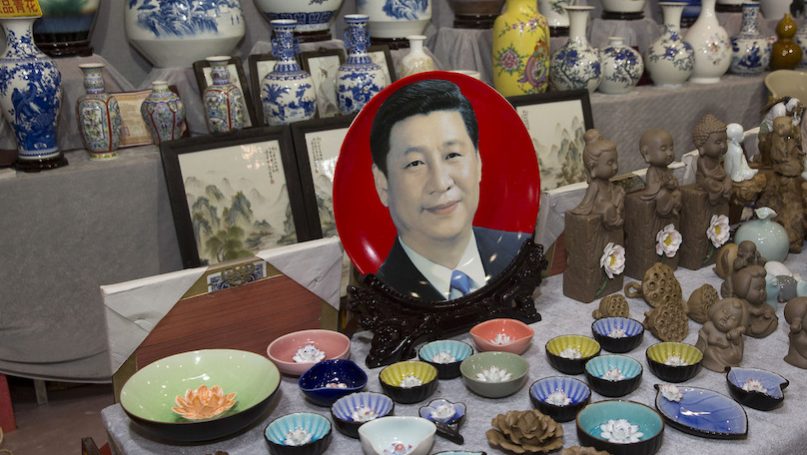
In late September 2022, rumours of Xi Jinping being overthrown in a military coup and placed under house arrest circulated in the online media. This unconfirmed information sparked a frenzy of speculation ahead of China’s 20th National Party Congress (NPC) – which is set to kick off on 16 October. Apparently, an account associated with the Beijing-banned Falun Gong movement is responsible. Nevertheless, the rumours circulated quickly and to some extent fed the netizen appetite for speculation.
Plots to oust the Party leadership are not a baseless fabrication but rather have been publicly stated by Party’s authorities. The dismissal of Bo Xilai from the office of Chongqing party secretary months prior to the 18th National Party Congress, for instance, was not a mere matter of “serious disciplinary violations”. Bo was believed to be Xi’s main rival for the CCP leadership and particularly, his ties to the military worried Xi’s political allies.
Following Bo’s downfall, Zhou Yongkang – who was a member of the Politburo Standing Committee – was also arrested and jailed for life. The Supreme People’s Court ruled Zhou guilty for his involvement in “unofficial political activities”. He became the highest-ranking party official in the post-Mao era to be sentenced to prison. Together with Bo, Zhou was rumoured to be plotting a coup ahead of the 18th NPC. Later, this rumour was implicitly confirmed by Xi Jinping himself who spoke in 2016 of “political plot activities” aim at destroying and dividing the party. Vice President Wang Qishan in 2017 also warned that some senior officials sought to “seize party and state power”.
Apart from Bo Xilai and Zhou Yongkang, Xi’s leadership also purged senior military officials like that of former Central Military Commission Vice Chairman General Guo Boxiong and his fellow General Xu Caihou. The official Chinese People Liberation Army website claimed that these two generals violated CCP’s “political bottom line”. The party’s authoritative figures never rule out coups as a means to challenge the leadership. They explicitly mention about the “plot” to “seize party and state power”. In other words, a coup is a possible outcome of political struggle within the Party.
The public knows about Xi’s ‘glorious’ past compared to his previous Chinese leaders, thanks to the party’s publication of Xi’s thoughts and biography. However, little that we know about sensitive issues such as Xi’s doctoral thesis in Marxist theory, which he completed at Tsinghua University while leading Fujian Province. Moreover, Xi does not have a media team or a press secretary. His absence from the public eye for certain periods often sparks rumours about his well-being.
Xi’s mystery is linked to his leadership style. Power and decision making are centralised in his persona. The Party’s Secretary General is no longer a primus inter pares as in Hu Jintao’s collective leadership era. Under Xi Jinping, the Secretary General dominates the decision making. A leader with centralised power does not want to be predictable so that rivals cannot anticipate actions. Secrecy is also a means to maintain power and information asymmetry with the governed. However, the more secretive a regime, the more prone it to rumours.
After cementing his power as party, military and state leader, Xi continually enhances his personal authority. First, in October 2016, Xi was officially made a “core leader” – a title signifying his personal authority. Second, the Party and the State in October 2017 and March 2018 respectively enshrined “Xi Jinping Thought” in the Constitution. Along with “Mao Zedong Thought” and “The Theory of Deng Xiaoping”, Xi became a living leader whose political doctrine is enshrined along with his name. Mao Zedong Thought and The Theory of Deng Xiaoping were added into the Party and the State constitution after they died. Third, the National People Congress in March 2018 abolished the State Constitution that limits an individual holding the Presidential office to two 5-year terms. Hence, Xi Jinping may continue to remain the head of the state after 2022. Fourth, in November 2021, the Party promulgated a resolution on history that summarized the Party’s 100-year journey. In the resolution, the Party established Xi as China’s core leader and his thought as China’s bedrock official doctrine.
The above-mentioned privileges enjoyed by Xi delivers the impression that he will stay in power for an uncertain period and lead China to achieve its national rejuvenation. This scheme exacerbates uncertainty in Chinese politics and threatens the norm of regeneration established by Deng Xiaoping. Unlike Jiang Zemin and Hu Jintao who had groomed the leader-in-waiting, Xi Jinping gives no clue about the person to whom he will pass the baton. The unwritten norm says qishang baxia which means those who reach age before 67 can stay and those who have reached 68 should retire from the Politburo Standing Committee (PSC). Four current members of PSC – Li Keqiang (67) Wang Yang (67), Wang Huning (67) and Zhao Leji (65) – are eligible to get re-elected in the 20th NPC, yet none of them are promoted as Xi’s successor-in-training. This is a deviation from the common practice which had prepared Hu Jintao and Xi Jinping himself prior to their ascension.
The four elements mentioned above are the main factors that lay the ground for rumours in a time such as this. The swirl of rumours indicates that by making his leadership excessively opaque, Xi only helps fuel speculation. It remains to be seen if such rumours harm China’s public relations and image. Yet, Xi can anticipate the damage by becoming more transparent to the public and resuming collective leadership to some extent.
Further Reading on E-International Relations
- Opinion – Xi Jinping’s People-Oriented Narrative
- Opinion – Former China-Premier Wen Jiabao’s Censored Essay
- Rebranding China’s Global Role: Xi Jinping at the World Economic Forum
- Opinion – Taiwan Could Be to China What Canada Is to the US
- Opinion – Reconciling China’s Zero-Covid Policy with History
- Opinion – China’s ‘New Cold War’ Posturing